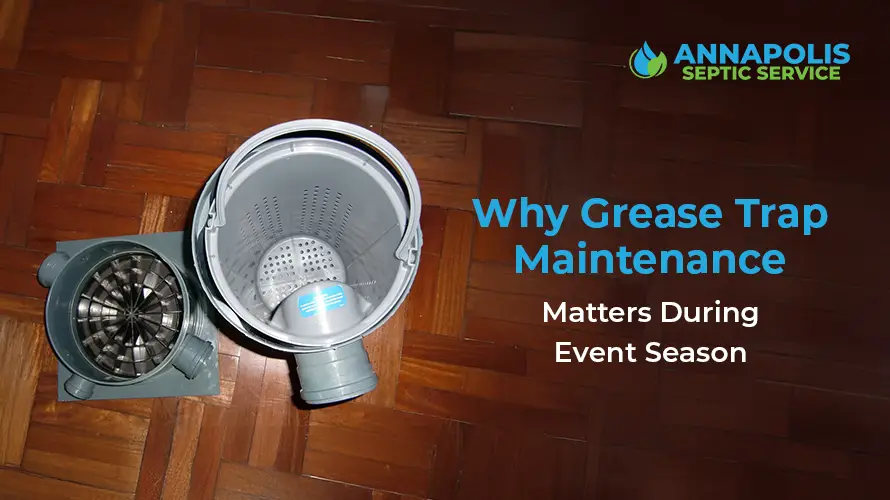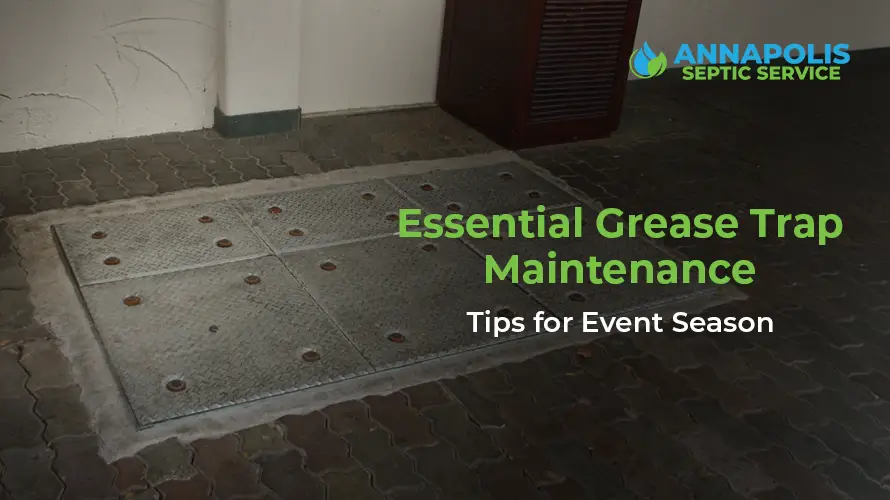Event season is a busy time for restaurants. With catering services, larger crowds, and more food being prepared, your kitchen is likely working overtime. While you focus on keeping the dining room bustling, it’s easy to overlook something as unglamorous as your grease trap. However, grease trap maintenance is absolutely essential during this busy season. A clogged or poorly maintained grease trap can lead to unpleasant odors, plumbing issues, and potential health code violations. In this guide, we’ll go over a grease trap maintenance checklist specifically for restaurants during the event season to keep your kitchen running smoothly.
Why Grease Trap Maintenance Is Crucial
Before diving into the checklist, let’s quickly go over why grease trap maintenance is so important. Grease traps are designed to intercept oils, fats, and grease from wastewater before they reach your plumbing system. Without regular maintenance, these substances can build up in the trap, causing blockages, unpleasant smells, and even costly repairs to your plumbing system. Additionally, an improperly maintained grease trap can attract pests or violate local health codes, leading to potential fines.
During the event season, your kitchen will likely be processing more food than usual, which means more grease will be entering the trap. That’s why it’s even more crucial to stay on top of maintenance during this time.
Grease Trap Maintenance Checklist for Restaurants
1. Inspect the Grease Trap Regularly
A proactive approach is always better than dealing with emergencies. Inspect your grease trap regularly to ensure that it is functioning correctly. Look for any signs of leaks, unusual odors, or overflows. Catching problems early will save you time and money in the long run.
If you notice that your grease trap is filling up more quickly than usual, it could indicate that your kitchen is producing more grease than it can handle. This is common during the event season when food prep ramps up. Be prepared to schedule more frequent maintenance during these peak times.
2. Check the Grease Trap’s Capacity
It’s essential to know the capacity of your grease trap and ensure that it’s suitable for the volume of food your restaurant is preparing. If your grease trap is too small for the amount of grease being produced, it will fill up faster, which can cause it to fail.
If you’re unsure about the size of your grease trap or whether it’s sufficient for your needs, don’t hesitate to contact a professional grease trap maintenance service provider. They can help assess your system and determine if an upgrade is necessary.
3. Clean Out the Grease Trap on Schedule
Proper cleaning is at the core of grease trap maintenance. You should have a cleaning schedule in place, depending on the volume of food and grease in your restaurant. A general rule of thumb is to clean out the grease trap every 1-3 months, but if you’re in the middle of the event season, it may be necessary to clean it more frequently.
During cleaning, a professional will remove all the grease, solids, and sludge that have accumulated in the trap. It’s essential to ensure that the trap is completely cleaned to avoid clogs. If you’re handling large events, cleaning may need to be done monthly or even bi-weekly to keep everything flowing smoothly.
4. Monitor the Grease Trap’s Condition
While cleaning, it’s important to monitor the condition of the grease trap. Look for signs of damage, such as cracks or rust, and check that the baffles (the components that help separate grease from wastewater) are intact and working correctly. If there are any issues with the trap itself, it’s best to address them right away to prevent further complications down the line.
5. Proper Disposal of Waste
Make sure you dispose of the waste collected during cleaning in an environmentally friendly way. Many local regulations prohibit dumping grease and sludge down the drain, as it can cause blockages and harm the environment. Contact an expert service provider to ensure that your waste is disposed of according to local guidelines.
6. Ensure Proper Drainage
Check that the grease trap has proper drainage and that wastewater flows freely. Any blockages in the lines can cause backups, which can result in unpleasant odors and slow drainage. If you notice any issues with drainage, have them addressed quickly to avoid larger plumbing problems during your busy season.
7. Schedule Professional Inspections
While you can take many steps to maintain your grease trap in-house, it’s always a good idea to schedule professional inspections. Grease trap experts can spot potential issues that might go unnoticed by untrained eyes. A professional grease trap maintenance service can also give you advice on how to maintain your system during the event season and ensure that everything is up to code.
If you don’t already have a trusted provider, consider scheduling a grease trap maintenance service in Bowie or Centreville to help you stay on top of maintenance during your busiest season.
Additional Tips for Event Season
During the event season, the flow of grease and waste can increase dramatically. Here are a few additional tips to help you manage your grease trap during this busy time:
- Reduce Grease Production: Train your staff to minimize the amount of grease used in cooking. For example, consider using degreasing agents in the kitchen that can help reduce the buildup in your grease trap.
- Plan Ahead: If you know you’ll be hosting large events, plan your grease trap maintenance in advance. Schedule cleanings before and after big events to ensure your trap can handle the extra load.
- Monitor Kitchen Practices: During busy times, staff may become more rushed or careless. Make sure everyone understands the importance of keeping grease out of drains and the importance of following the right procedures for grease disposal.
If you’d like more tips on maintaining your grease trap properly, read our blog post titled The Ultimate Guide to Grease Trap Maintenance for Annapolis Restaurants It goes into detail about how to keep your grease trap in top condition during the event season, with plenty of practical advice for Annapolis-area restaurants.
How Annapolis Septic Service Can Help

Managing grease trap maintenance during the event season can be overwhelming, especially when you have a busy kitchen to run. That’s where Annapolis Septic Service comes in. We specialize in professional grease trap maintenance and can help ensure your system is operating at peak efficiency throughout the busy season. Contact us today to find out how we can help!
Our expert team can provide everything from regular inspections and cleanings to repairs and replacements. With our help, you’ll never have to worry about grease trap issues ruining your event season. We serve restaurants across the Annapolis area, and our reputation for reliable service makes us a trusted choice for grease trap maintenance.
Keeping your grease trap in top condition during the event season is essential for smooth operations in your restaurant. From regular inspections and cleanings to managing grease production, following the proper maintenance checklist will ensure you avoid costly repairs and health code violations. If you’re in need of a professional grease trap maintenance service in Bowie, Centreville, Annapolis, Severna Park, and nearby areas, don’t hesitate to reach out to a trusted expert.

